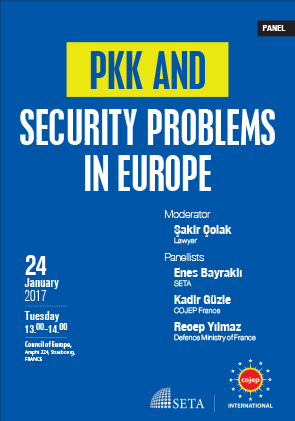Event
PKK and Security Problems in Europe
- Date : 24/01/2017
- Time : 13:00
- Venue : Council of Europe
- Address : Council of Europe, Amphi 224, Strasbourg, France
- Moderator : Şakir Çolak, Lawyer
- Speakers :Enes Bayraklı, SETA
Kadir Güzle, COJEP France
RecepYılmaz, Ministry of Defence of France
After sabotaging the “Solution/Peace Process” in Turkey, PKK increased its terrorist attacks throughout Turkey, but following the arrest of the HDP parliamentarians because of their support to PKK, it started to spread its attacks in many European countries, especially in Austria, France, Germany, Sweden and the UK. Although these attacks have violated the public order and security, the mentioned countries have not taken adequate measures against PKK yet. On 24th January 2017, SETA organized a panel entitled “PKK and Security Problems in Europe” in Strasbourg/France in cooperation with Conseil pour la Justice, l’Egalite et la Paix (COJEP). The event served to draw attention to the terrorist attacks of PKK and other security problems in the European countries. Before the event, an exhibition of pictures of the civilians and officials massacred by PKK terrorists was presented.
Emine Nur Günay, Member of Turkish Parliament and Parliamentary Assembly of the Council of Europe, made a general assessment about the activities of PKK in the European countries. She noted that although there is a common fight against terrorism between Turkey and Europe, PKK has been operating freely in the European countries. From this point of view, she stated that Turkey’s relations with the European countries have been damaged due to this situation. However, she underlined that Turkey will continue to struggle with PKK in every field in the future.
The first speaker of the panel, moderated by the Lawyer Şakir Çolak, Enes Bayraklı from SETA started his speech by talking about the establishment process of PKK. Bayraklı said that the attacks on Turkey accelerated after the PKK militants migrated to Europe following the coup in Turkey in 1980. Later, he said that although PKK is recognized as a terrorist organization by the European countries, it still collects large amounts of money through associations and foundations established throughout the continent. He also stated that Turkey has not been able to receive sufficient support from its allies, such as NATO, European Union and Council of Europe. Bayraklı ended his speech by recalling that PKK is a threat to all European countries as well because it has a source of income from many illegal methods, especially drug and human trafficking, all of which directly and negatively affect the European societies.
The second speaker of the panel Recep Yılmaz, advisor at the French Ministry of Defence, said that there are approximately 1.5 million Kurdish citizens across Europe, but although there are significant ethnic, religious and cultural differences among those Kurdish people, they are mixed up in advance with PKK. After emphasizing that the Kurds came to Europe with the left-wing Turks who migrated to Europe after the 1980 coup, Yılmaz explained that the number of Kurdish PKK sympathizers in Europe is around 50.000 and that only around 10.000 of them support PKK. From this point of view, Yılmaz said that PKK is not the representative of the Kurds as it claims the reverse. He also underlined that PKK is an increasing threat to Europe and that it has been noticed by the European countries in the recent period. “We know that drug and human trafficking, smuggling, money laundering and aid campaigns are the main income sources of PKK. According to the German justice, 80 percent of the drugs found in the country are related to PKK. There is a similar figure in the UK. Hence, it is very clear that PKK and its activities are damaging the people living in Europe” he added.
The panel ended with question-answer section.
